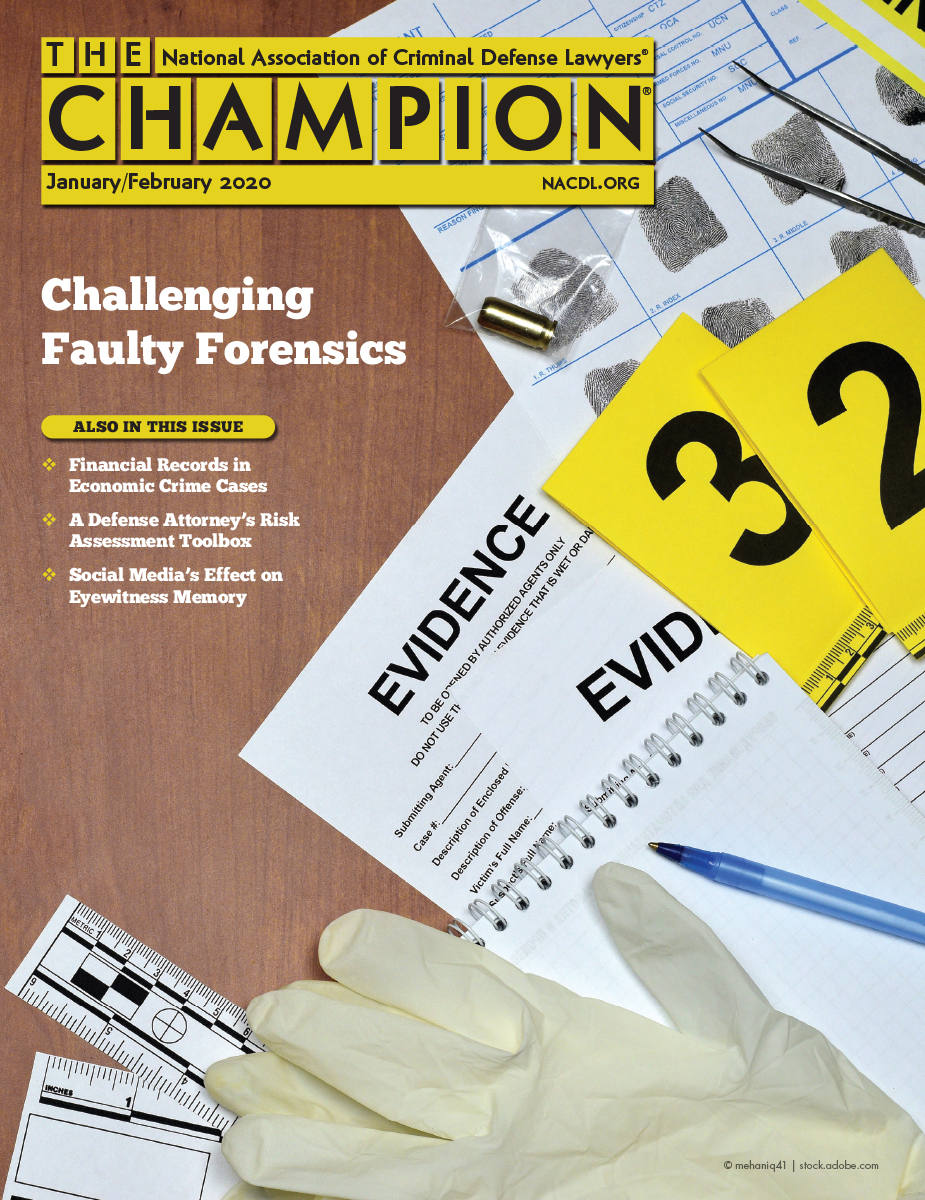January/February 2020

How can defense attorneys challenge forensic evidence pretrial, during trial, or after conviction?
Articles in this Issue
-
A Basic Risk Assessment Toolbox: Aiming for Adequate Lawyering During the Spread of Risk Assessments
Risk assessment – the assessment of risk of reoffending or risk of future violent behavior – is a hot topic. However, only rarely do lawyers address the questions raised by criminal justice-related risk assessment. This finding suggests that defense lawyers may not be paying enough attention to the issue. A key issue involves addressing how the risk assessment connects the dots between a specific client’s circumstances and the factors related to reoffending and violence.
-
A Primer on Financial Records in Economic Crime Cases
White collar financial and economic cases can involve voluminous and confusing documents, but these cases need not be feared. The authors discuss the importance of financial records received as well as exculpatory records that are sometimes not provided. Is it a criminal case, a civil case, or just a bad investment? The answer is almost always somewhere in the documents.
-
Affiliate News
What events are NACDL affiliates hosting this month? Find out here.
-
Book Review: Stories from Trailblazing Women Lawyers by Jill Norgren
This month Susan Elizabeth Reese reviews Stories from Trailblazing Women Lawyers: Lives in the Law by Jill Norgren.
-
Book Review: The Master Plan by Chris Wilson and Bret Witter
This month Tony Bornstein reviews The Master Plan: My Journey from Life in Prison to a Life of Purpose by Chris Wilson with Bret Witter.
-
Book Review: The Mueller Investigation and Beyond by Ellen S. Podgor et al
This month Lissa Griffin reviews The Mueller Investigation and Beyond by Ellen S. Podgor et al.
-
Cross Country: Challenge the allegation. Ignore the alligator.
Constructive cross-examination means using cross to cause the prosecutor’s witnesses to admit facts that they left out or understated.
-
From the President: Compassionate Release: The Nuts and Bolts
Congress amended 18 U.S.C. § 3582 to permit prisoners to file their own motions for compassionate release.
-
How Exposure to Social Media Affects Eyewitness Memory
Because social media has reached a point of near saturation, people now have access to what seems like endless photographs of people in their community, and many witnesses have begun to use this as a resource to conduct their own criminal investigations. Jurors should be educated about how exposure to social media images may have affected the eyewitness evidence being brought before them.
-
Inside NACDL: Defense vs. Geofence: NACDL Defends the Fourth Amendment in the Digital Age
A case in the Eastern District of Virginia, United States v. Chatrie, involves a geofence warrant, which is a warrant seeking Google cellphone location data so that the police can identify individuals who were in a particular location during a defined window of time.
-
NACDL News: NACDL and Charles Koch Foundation Mark the One-Year Anniversary of the First Step Act
NACDL News for January-February 2020
-
Science in the Courtroom: Challenging Faulty Forensics
In recent years, prosecutors have increasingly relied on forensic science to secure criminal convictions. There has been a growing skepticism, however, about the supposed infallibility of some forensic sciences. Janis Puracal and Aliza Kaplan provide a general framework for challenges to these forensic disciplines, pointing out some of the ways attorneys can raise challenges pretrial, at trial, or after conviction.
